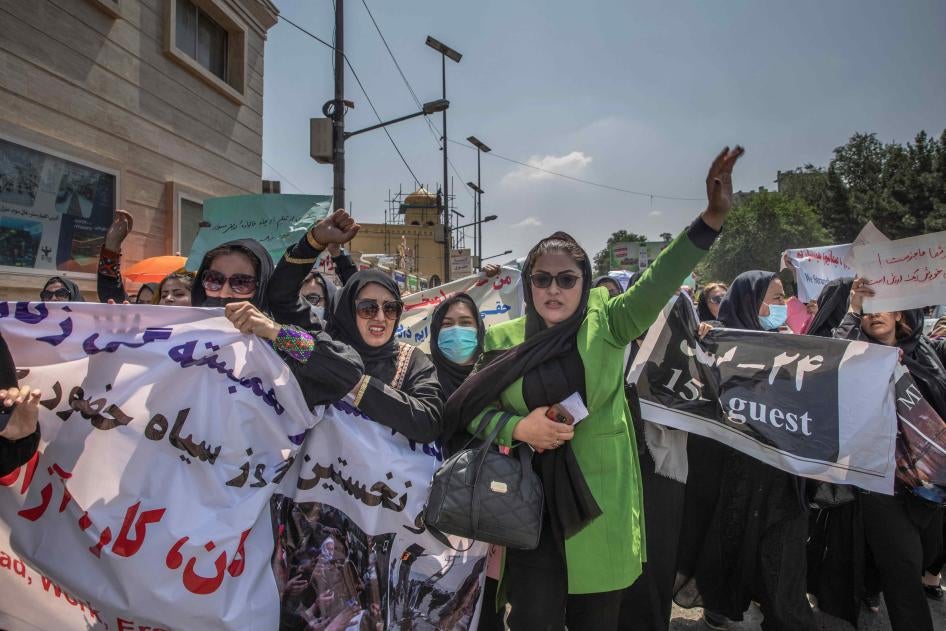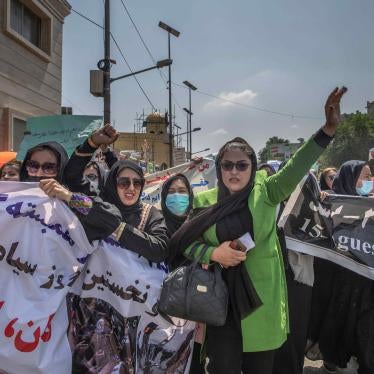Dear Excellencies,
We write to you ahead of the third UN-convened meeting of Special Envoys and Special Representatives on Afghanistan on 30 June–1 July 2024 in Doha, Qatar (“Doha III”), to continue to discuss the international community’s approach to Afghanistan. More than one year since the first Doha meeting, there is growing concern that the international community lacks the necessary resolve to defend and advocate for the human rights of Afghan women and girls. Many Afghan women civil society have even called for a boycott of continued negotiations with the Taliban until women’s rights are restored.[1] Doha III therefore offers a decisive opportunity to demonstrate to all Afghans that their human rights are not a bargaining chip, but the foundation on which the future of their country depends.
Since the last Doha meeting in February 2024, the Taliban’s abuses against Afghan women and girls, already unparalleled globally and condemned by international experts as gender apartheid, have continued to deepen.[2] The Taliban are not only continuing to impose new restrictions violating the rights of women and girls, now numbering 97, but steadily intensifying their enforcement of existing decrees.[3] The space for women and girls to make their own decisions and live their lives gets smaller every day. This is a clear signal that the international community’s approach to Afghanistan has thus far failed to deter the Taliban from its systematic repression of women’s rights.
The upcoming meeting in Doha is a critical moment for the UN, Security Council and international community to coordinate around one key message: the rights of Afghan women and girls are not negotiable.
The success of the international community’s approach to Afghanistan, and the credibility of the Doha process, should be measured not by whether the Taliban choose to participate, but by whether the UN and Member States can meaningfully coalesce around a clear, transparent and non-negotiable set of principles upholding human rights, especially women’s rights and women’s participation. We urge you not to concede to any of the Taliban’s stated conditions for participation that would undermine addressing the protection of women’s human rights or the full, robust and regular participation of diverse Afghan women civil society in any decision-making about their country’s future, including the Doha process.
Ahead of Doha III, we further urge you to ensure the following:
- Women’s rights must be a central topic of discussions in Doha. Respect for women’s rights must be a core objective of the international community’s engagement on Afghanistan, and a standing agenda item at all upcoming and future discussions in Doha. Women’s rights must also be addressed in discussions on any other aspect of the situation in Afghanistan, such as the humanitarian crisis, a political process, climate change, counter-narcotics, counter-terrorism, the economy and development efforts.
- Principled engagement requires centering human rights and accountability. We urge Member States to coordinate and establish clear safeguards around the following principles:
- The full spectrum of women’s human rights must be respected, without exception, in accordance with Afghanistan’s international obligations,[4] including under the Convention on the Elimination of All Forms of Discrimination Against Women (CEDAW). All restrictions violating the rights of Afghan women and girls, including, but not limited to, education, work, movement, assembly, expression and dress must be immediately and unconditionally removed in accordance with Resolution 2681 (2023).
- Women’s full, equal, meaningful and safe participation in all aspects of public life and decision-making, including in any political process, must be guaranteed.
- All humanitarian actors and their donors must ensure safe, gender-responsive, principled and non-discriminatory humanitarian delivery to all Afghans in need. This requires calling on the Taliban to immediately lift the ban on Afghan women working for the United Nations and non-governmental organizations (NGOs), which is in violation of the UN Charter and CEDAW; supporting the full and safe participation and leadership of women and women-led organizations in humanitarian decision-making and delivery; ensuring that women aid workers are not replaced by men; and increasing support to humanitarian organizations, particularly those led by Afghan women.
- The targeting of all human rights defenders, including women protestors and civil society, peacefully exercising their freedom of expression and assembly, must end immediately.
- Perpetrators of violations of international human rights and humanitarian law, including gender persecution and other abuses targeting diverse women and girls, must be held accountable.
- The international community should reiterate its clear and unified demand for the Taliban to swiftly reverse all policies and practices that restrict the enjoyment by women and girls of their human rights and fundamental freedoms, as per Resolution 2681 (2023), and refrain from sending any countervailing signals that downplay the seriousness of the human rights crisis in the country. Afghan women have been clear that the international community must refrain from granting the Taliban a seat at the UN or inviting them to UN-convened meetings, reopening diplomatic missions in the country or handing over diplomatic missions outside of Afghanistan to them, or lifting sanctions—all of which risk legitimizing a regime that continues to violate women’s human rights, Afghanistan’s international legal obligations, and Security Council resolutions. International experts have further called on Member States to avoid normalization or legitimization of the Taliban until there is demonstrated, measurable and independently verified progress on all human rights, especially women’s rights.[5]
- The full, equal, meaningful and safe participation of diverse women civil society and human rights defenders is essential to the legitimacy of the meetings in Doha. Meeting to discuss Afghanistan without half its population represented undermines both the Doha process and its outcomes, as well as any future engagement strategy by the international community. We therefore urge you to ensure that diverse Afghan women, including women human rights defenders, peacebuilders, protestors, youth, and those representing ethnic, religious, LGBTQI+, persons with disabilities and other marginalized groups, are full participants in all discussions and processes in Doha and beyond; that they have regular, and multiple, avenues and opportunities to express their views; that their recommendations are reflected in any outcomes; and that there is full transparency regarding both these processes and their outcomes so that Afghan women and civil society have clarity about how their perspectives inform the international community’s approach to Afghanistan.
- The proposed UN Special Envoy for Afghanistan, due to be appointed, must be the principled voice of the international community. The Special Envoy must have a strong track record on human rights and women’s rights, as required by Resolution 2721 (2023); include senior gender and human rights expertise on their team; regularly and meaningfully engage with diverse Afghan women civil society and human rights defenders; and ensure that their views inform all aspects of the Envoy’s work.
While members of the international community are moving perilously close to accepting the legitimacy of Taliban rule, Afghanistan’s women, who are bravely fighting back and paying a devastating price as a result, are not. We urge you to do everything in your power to support them.
Sincerely,
Kaavya Asoka
Executive Director, NGO Working Group on Women, Peace and Security
On behalf of the following members of the NGO Working Group on Women, Peace and Security:
- Amnesty International
- Global Justice Center (GJC)
- Global Network of Women Peacebuilders (GNWP)
- Human Rights Watch (HRW)
- MADRE
- Nobel Women’s Initiative (NWI)
- Outright International
- Refugees International
- Women Enabled International (WEI)
- Women for Women International (WfWI)
- Women’s International League for Peace and Freedom (WILPF)
_____________
[1] For instance, see: Kabul Now, “Women Activists Criticize Taliban’s Invitation to UN Meeting on Afghanistan” (31 May 2024); Amu TV, “Women activists urge Boycott of Doha meeting on Afghanistan” (2 June 2024); @WomanProtestors, “Statement of the Women’s Movement Towards Freedom” (3 June 2024); Amu TV, “Women protestors demand Taliban boycott at Doha meeting” (4 June 2024); and @FemenaNet, “1/ As the UN prepares to convene the next special envoys meeting in Doha, we stand in unwavering solidarity with the courageous women of Afghanistan who continue to fight for their rights and their voices to be heard.” (5 June 2024).
[2] The situation in Afghanistan has been characterized as gender apartheid by a number of key UN officials, including, but not limited to: UN Secretary-General António Guterres (12 January 2023); UN High Commissioner for Human Rights Volker Türk (24 May 2023); UN Under-Secretary-General and UN Women Executive Director Sima Bahous (26 September 2023, 7 March, 2023 and 8 March 2022); the UN Working Group on discrimination against women and girls (15 February 2024); and the UN Special Rapporteur on the situation of human rights in Afghanistan (22 February 2024). At the UN Security Council, Member States, including Albania (20 December 2023, 26 September 2023 and 20 December 2022), Ecuador (26 September 2023), the European Union (12 March 2024 and 23 February 2023), Malta (23 April 2024 and 25 October 2023), Spain (13 April 2022) and the United Arab Emirates (26 January 2023 and 20 October 2022), and civil society representatives, including Shaharzad Akbar (20 December 2023), Karima Bennoune (26 September 2023), Zubaida Akbar (8 March 2023) and Zahra Nader (20 October 2022), have also characterized the situation as gender apartheid. See also: Karima Bennoune, “The International Obligation to Counter Gender Apartheid in Afghanistan,” Columbia Human Rights Law Review 54, no. 1, 2022.
[3] For instance, see: US Institute of Peace, “Tracking the Taliban’s (Mis)Treatment of Women” (last updated September 2023).
[4] Afghanistan’s international obligations include: the Convention on the Elimination of All Forms of Discrimination against Women; the Convention against Torture and Other Cruel Inhuman or Degrading Treatment or Punishment; the International Covenant on Civil and Political Rights; the International Covenant on Economic, Social and Cultural Rights; the Convention on the Rights of the Child; the International Convention on the Elimination of All Forms of Racial Discrimination; and the Convention on the Rights of Persons with Disabilities.
[5] See also: “The phenomenon of an institutionalized system of discrimination, segregation, disrespect for human dignity and exclusion of women and girls,” Report of the Special Rapporteur on the situation of human rights in Afghanistan, A/HRC/56/25 (13 May 2024).








